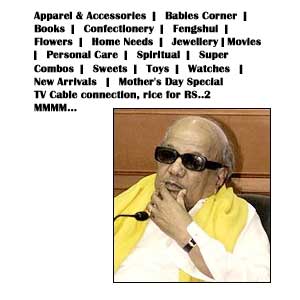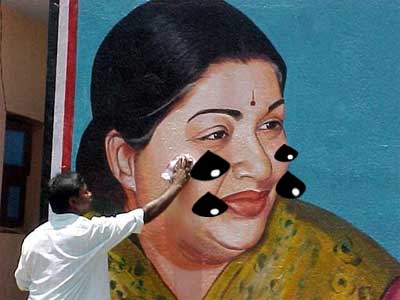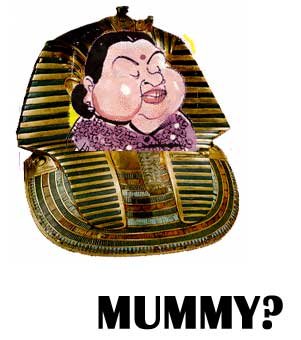The election campaign has officially ended; People are ready to vote. Now it is a good time to recap the undercurrents of this election campaign.
Usually, in a campaign, the bulk of the agenda is set by the people. As we go through the campaign, the media feels the pulse of the people and comes up with the issues that the people care for (through polls like "what is the most important thing in this election" etc). Candidates quickly latch on to this agenda and either ride the wave or shape public opinion if they are able to convince otherwise.
This election is a strange one, in the sense that most of the agenda was set by the politicians themselves. Issues that a common man might be interested in were barely discussed, and the main issues were the ones that the parties tried to project. I guess the main reason for this is the lack of a powerful independent/unbiased media. The media in this election was polarized more than ever, and this kind of ensured that the people's concerns were not given the prominence that they should have been given.
In this light, the strategies of each political party becomes extremely important. I think there were three main strategies that completely shaped up this election. Which of these will be the coup de grâce, I am not sure.
1. The DMK manifesto: The ADMK were going to town with the emphasis on the performance of their government. In reality, what did they have to show to the voters that would be instant positives? Not the way in which it dealt with the government workers (which I totally support and was sad to see it being painted in a negative light now). Not the ruthless manner in which people like Veerappan were "encountered" or Jayendrar was arrested. The main things that Jayalalitha could campaign on were her giveaways. Free bicycle. 2000 Rupees for those hit by the rains. Tsunami relief money.
In a powerful move, Karunanidhi countered it by promising more freebies. Free Color TV. Rice at Rs 2 a kg. 2 acres arid land to farmers (though the Sun TV ads wrongly (and knowingly) claimed "2 acres farm land").
The impact of these freebies were not obvious at first. VaiKo had a field day convincing people that these schemes would never work. Looked like people didn't believe that these could be done... till Jayalalitha followed suit.
By promising free 10 kg rice, Jayalalitha implicitly accepted that the DMK manifesto was a big hit and needed to be neutralized. I think it was a losing move politically and gave a lot of credibility to the DMK promises.
2. Shift of the evil, rich family tag: Think of what happened during the last time Jayalalitha faced an election when in power. The talk was on the rampant corruption in her government and the money embezzled by Sasikala and her family. Images of the vaLarppu magan's marriage didn't help. Sasikala, Bhaskaran, Sudhakaran, Dinakaran and all other karans in her family were painted as the people who swiped hundreds of crores of rupees. The vote in that election was also a vote against this powerful family.
Fast forward to this election. I don't think Sasikala and her cronies have stopped doing what they did before. I don't think her family has not earned a decent sum during the last five years. Yet, the tag of the evil, rich family went surprisingly to the other side, the one that was not in power in the state! Kalaignar's family, especially his Sun TV nephews, were branded as the money grabbers. The ill-timed Sun TV IPO didn't help. News that Dayanithi Maaran threatened the Tatas didn't help. Defectors like Vaiko, Sarathkumar and others bemoaned that DMK was catering to the interest of Kalaignar's family alone.
Whether the decision to target the Maaran brothers and their wealth/monopoly was Vaiko's or Jayalalitha's, we won't know, but it was a highly successful strategy. Instead of talking about the ruling party's corruption and embezzlement (who remembers any accusation other than the one on MIDAS?), DMK was forced to respond and keep up with the questions asked. Whatever be the outcome of the election, I think that DMK is stuck with the Sun Network tag, that it is trying to create a monopoly in the media, with a clear help from its people in the power.
3. The first two were straightforward, but the third strategy, whose importance I think we would see more after the election, is pretty subtle.
It can be summed up by this telling image in Dinakaran today. It is the last day of election campaign. Karunanidhi addresses a meeting with V.P.Singh. The photo that is there in the link is the one in the Dinakaran front page, covering the final moment of the campaign. Now, you see V.P.Singh, Karunanidhi and Dayanithi Maaran. Where is Stalin?
The third strategy that has influenced this election is the prominence given to Dayanithi Maaran and the lack of prominence given to Stalin. Dayanithi Maaran was the DMK's hero of this campaign. Issues were centered around him. DMK's main "achievements" at the centre were symbolized by his photos with Bill Gates, his BSNL One Rupee a call programme, and his involvement in pretty much everything. He was there at each and every occasion. Sun TV gave more coverage to him than Stalin. Even Dinakaran wrote that the manifesto was shaped up mainly by Dayanithi Maaran and Kalaignar.
Does anyone remember a single intelligent thing said by Stalin throughout this campaign? Vijaykanth jumped into politics yesterday and still, more people wanted him to be the next chief minister than Stalin.
I think this was a very deliberate decision by Kalaignar.
This can be interpreted in two ways: Either Kalaignar is underplaying Stalin, so that the voting public don't realize that they are actually going to vote for Stalin (he is the chief minister in waiting) and given his popularity, that will be a huge negative. Or, Karunanidhi has decided that Stalin is not his heir after all, and is grooming Dayanithi Maaran to usurp the leadership after his time.
Either way, what happened was that whenever the question of leadership after Karunanidhi came up, the question was not answered, or was evaded. So, is Stalin not the next head? Is Dayanithi Maaran going to play a more active role in the state politics?





